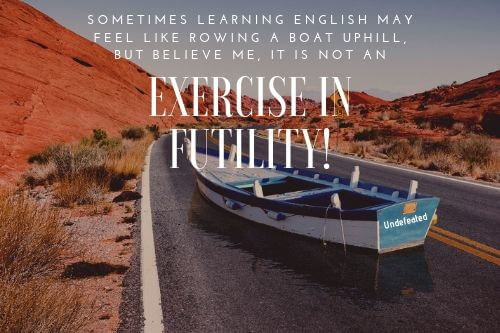
Phrase: Exercise in futility
Did you know that most people in the world are bilingual?
Yep, it’s true being monolingual is not the norm.
Many Japanese may feel that studying English is an exercise in futility, but they are mistaken.
People around the world learn to speak English every day.
It enables them to communicate internationally, acquire a better job and increase their quality of life.
Studying anything, most of all English is never an exercise in futility.
Let me explain.
The word futile means your efforts are wasted because you do not achieve an outcome.
Futility is the noun form of the word.
Therefore, if something is an exercise in futility, it means that all your efforts are useless and will never achieve success.
From my experience, when it comes to learning English, many Japanese tend to look at the big picture, not the small one.
They tend to say they want to speak like a native speaker and are disappointed when they cannot.
Thus, they feel like giving up because their studies seem to be an exercise in futility.
Well, I say you have to look at the small picture.
Wars are never won on the first day.
However, the one who wins the war will have won many battles, large and small.
All those more minor victories eventually add up to winning the war.
Every little positive action you take in English is a victory.
It’s never an exercise in futility.
Take care of the pennies, and the pounds will take care of themselves, as the Brits say.
If you’ve read this far, congratulations.
It’s one more little victory for you.
Flesch-Kincaid Readability Test
This post is understandable by someone with at least an 8th-grade education (age 13 – 14).
On the Flesch-Kincaid reading-ease test, this post scores 69.
The higher the score on a scale of 0 – 100, the easier the passage is to read.